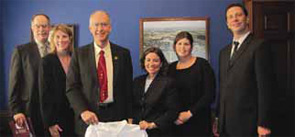Next year is shaping up to be an important year for rheumatology on Capitol Hill. Issues that remain unresolved by the last Congress include concerns within the Affordable Care Act, the need for a stable Medicare system with fair physician reimbursement, funding for the pediatric subspecialty loan repayment program, and appropriate reimbursement for specialty care. Most congressional leaders, newly elected or re-elected, know very little about arthritis and other rheumatic diseases. That is why it is critical that rheumatology professionals reach out and educate them on the importance of specialty care and the impact these diseases have on one’s quality of life.

An easy resolution for the new year is to get involved in ACR’s advocacy efforts and make a difference in rheumatology. The ACR offers multiple ways for you to get involved in advocacy efforts and to influence what health policy decisions are made on Capitol Hill.
Meet with your member of Congress: The ACR can help organize a meeting in your district, on Capitol Hill, or you can join the ACR’s Advocates for Arthritis fly-in held each September in Washington, D.C. An in-person meeting is an effective way to convey your message and allows you to build a relationship with your legislators and their staff.
Respond to Calls to Action: The ACR sends e-mail alerts to the membership when grassroots action on issues affecting the rheumatology community is needed. When these grassroots alerts arise, take a few minutes out of your day to place a phone call using the American Medical Association’s Grassroots Hotline at 1-800-833-6354, or send an e-mail using the ACR’s Legislative Action Center at www.rheumatology.org/advocacy.
Get your patients involved: Your patients are constituents, too. Patients have personal stories to share about the frustration of insurance denials, restrictions in Medicare reimbursements, and the lack of research funding in rheumatology. Encourage them to call or write their members of Congress. They can also sign up to receive Calls to Action by e-mailing [email protected].
Learn About RheumPAC: RheumPAC is the voluntary, nonpartisan political action committee of the ACR. It is the only PAC that directly represents the interests of rheumatology professionals on Capitol Hill and works to support and elect pro-rheumatology candidates. For more information visit www.rheumatology.org/RheumPAC.
Let’s make a difference in 2011. It will take the voice of the entire rheumatology community to educate Congress, so start today. To find your legislator’s contact information or for more information on ACR advocacy activities, please contact [email protected] or visit www.rheumatology.org/advocacy.